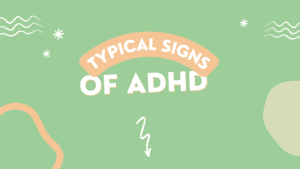What is ADHD
ADHD stands for attention deficit hyperactivity disorder. It is one of the most common diagnoses in childhood, and can last into and affect adults as well. ADHD is considered a neurodevelopmental disorder, and can be diagnosed by mental health professionals. It also ranges vastly in terms of the intensity of symptoms among individuals. While there is no one single evaluation test on its own for this diagnosis, there are multiple ways come to a decisive diagnosis.
ADHD is believed to be both a mixture of genetics, as well as environmental factors, although more research needs to be conducted on specific environmental factors. ADHD is known to affect “professional areas of life,” as in school and work in particular. ADHD, in truth, can affect multiple areas of life.
There are three main typed of ADHD: predominantly inattentive (think: difficulty concentrating/focusing), predominantly hyperactive, and combined types. We are now going to explain differences in symptoms among children and adults. After, we will explore tips for support for ADHD whether that is for you or a loved one. We will also discuss ways to support a child with ADHD versus an adult.

In Children
Symptoms of ADHD are important to know. Oftentimes, symptoms of ADHD are falsely labeled as “negative behaviors” when they are actually signs of a neurodevelopmental diagnosis beginning to form. Below is a list of symptoms which are commonly found in children with ADHD:
- Forgetfulness
- Multiple homework errors, also known as “careless mistakes”
- Difficulties concentrating
- Difficulties staying still
- Excess talking
- Disorganized
- Difficulties communicating with others
- Impulsive behaviors
If your child begins to receive feedback that falls into these categories from school, it is important to not take this as a sign that your child is “being bad.” It is possible that your child in no means engages in these behaviors maliciously. Your child may be displaying signs of ADHD.
Remember, these symptoms can vary tremendously in intensity. Even if your child is experiencing these symptoms on the more mild end, it is still good to speak with a counselor to rule out ADHD because early intervention has been shown to extremely effective in managing ADHD.
In Adults
Adults will display similar symptoms as youth with ADHD, but there are some marked differences. The main one is that by adulthood, these behaviors may come across as less disruptive. Unfortunately, some of these symptoms make adults with ADHD labeled falsely as “rude.” If you or someone you know has ADHD in adulthood or displays these symptoms it is important to understand this is not out of rudeness, they are symptoms of a diagnosis:
- Frequently interrupts in conversation
- May walk away before a conversation is over
- “Blurts” out words
- Distracted/difficulty concentrating
- Makes careless errors at work
- May hyper fixate on certain tasks
Again, it is important to remember if you or an adult you know displays these symptoms that this may be the result of a neurodevelopmental diagnosis.
Tips for Support
Now that we have discussed the ways to recognize ADHD, we are going to discuss the ways you can support yourself, or someone else with the diagnosis. First, we will talk about ways to support yourself. Then, we will discuss ways to support someone you know with ADHD.
For You
If you have ADHD, there are several things you can do to support yourself and your symptoms!
-
Affirm yourself and your diagnosis
It is important to remind yourself that while your diagnosis is a part of you- it isn’t all of you! Perhaps you have spent a lot of time talking about ADHD with others, or unfortunately received negative remarks because of it. Remind yourself of your strength and what you have to offer- both as an individual and with ADHD! Learning to get comfortable with yourself with the diagnosis will boost your mood and confidence.
-
Learn strategies that work for you
You may notice that because of ADHD, some areas of life may be more challenging, such as work. If that is the case, it is important to learn skills to make these areas easier. By working with a professional trained in ADHD, you will learn skills that are known to assist with the diagnosis.
-
Go at a pace that works well for you
Learning to time your days and schedule at a pace that works well for you is very important in managing ADHD. This is personal and varies from person to person. Take your time to experiment with what works for you!
For a Loved One
If you know someone with ADHD, it is important to support them in their journey. Not everyone with ADHD has their symptoms taken seriously and empathically. Having a deeper understanding of your loved one’s diagnosis will not only help them feel supported but will deepen your bond with each other.
We are now going to touch on ways which you can support a youth with ADHD as well as an adult.
A Loved One Who is a Minor
If you know a child or adolescent with ADHD you can use the following strategies to support them:
-
Be patient
-
Boost Their Confidence
-
Encourage them to find things that help
If you are a parent or legal guardian of the child, helping them connect with a professional to teach them coping strategies is important. The earlier youth with ADHD learn these skills, the easier it will be for them navigate their symptoms in adulthood. If you are not a legal guardian, you can help encourage children and youth to explore ways that their challenges become easier. For example, maybe the youth in your life needs a break between school and starting homework, or they need time to move their bodies periodically. Encourage them that’s normal if it helps!
A Loved One Who is an Adult
If there is an adult in your life with ADHD there are several things you can do as well to support them.
-
Ask how you can be supportive
-
Be encouraging
Cheer on the adult in your life for their wins. Whether that is doing something challenging, or getting something done- make sure to highlight all the wins!
Next Steps
At online-therapy, we have counsellors who support our clients of varying needs. One of those ways is we have therapists who specialize in ADHD!




Leave A Comment